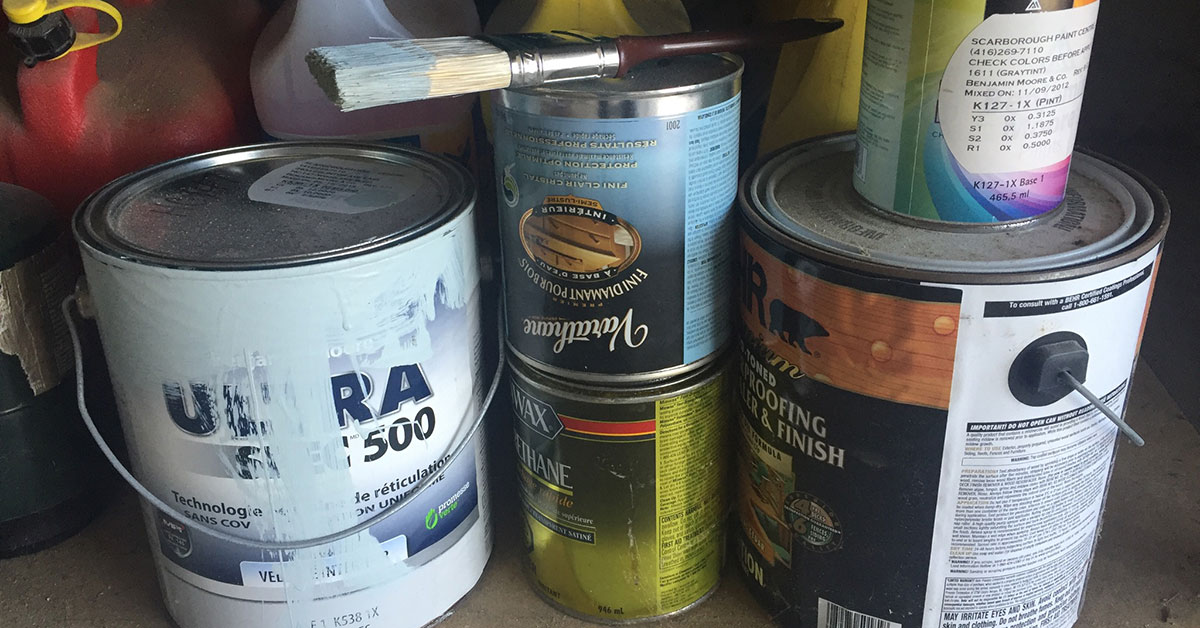When you’re looking for extra storage space in your home, the garage is one of the more logical choices because of its size.
Unfortunately, not everything is suited to being stored in your garage space. Think twice about where your overflow house storage ends up, otherwise you may be faced with damaged items and potential safety issues.
Fluctuating garage temperatures and moisture levels pose the biggest threat to the safekeeping of certain household items in this area of the home.
Even if you live in a southern climate that doesn’t experience extreme temperature shifts, high humidity levels can make some items stored in the garage vulnerable to damage.
Use this garage storage advice to keep your belongings safe
Unless your garage is reliably climate-controlled, you’ll want to follow the garage storage advice listed here to keep your belongings and home safe.
Going through your garage to separate items that shouldn’t be stored there will give you a great opportunity to declutter, as many of the items on our list are things you can probably part with.
Don’t let the convenience of having space in your garage for storage override the fact that when it comes to some of your belongings, it’s more sensible to store them elsewhere. Ensure the nine items below aren’t being stored within your garage space.
1. A fridge or freezer
If you have a second fridge or chest freezer running in your garage, you might want to consider putting it in a climate-controlled location.
Extreme heat or cold environments can cause these appliances to work overtime to keep their contents at the right temperature. And even with newer energy-efficient appliances, you might notice the extra costs on your hydro bills.
And if the fridge or freezer in your garage is really old, your wallet will definitely feel the effects of running it. It’s estimated that a fridge manufactured before 1990 could cost you between $250-300 a year to operate in your garage. Use this Energy Star calculator to get an estimate on the cost of running your old garage fridge.
That fridge or freezer running in your garage can also add to the moisture levels within the space and contribute to how much condensation your garage has. If your garage lacks proper ventilation, this issue is only compounded.
2. Old photos, paper, and cardboard
The second thing our garage storage advice recommends you store elsewhere are any paper-based products and items. The changing temperatures and moisture levels that all garages experience are particularly unkind to these items.
Exposure to fluctuating temperatures and moisture will cause your photos to curl, stick together, dry out, and become discolored. They’re better off being digitized or stored in conditions that are cool, dark, and dry, such as in a closet.
Old newspapers, books, magazines, vinyl album jackets, and papers (like old tax returns and bills) will also show the negative effects of being stored in the garage in less time than you’d think. Artwork and important documents should also be stored in your heated living space.
Aside from the fact that all of these paper-based products aren’t going to fare well when stored in the garage, there’s three other important reasons they shouldn’t be stored there:
- they’re a fire hazard
- household pests (like mice and insects) enjoy using paper-based products for making nests
- mold may form on them in certain conditions
3. Propane tanks
Propane tanks are one of the most common items stored in garages that actually have no business being kept there. Barbecue propane tanks and propane tanks used with welding tools are highly combustible and need to be properly stored.
Even if the tank’s valve is shut off, it still poses an ignition and fire hazard that can cause catastrophic damage. Consider that the tank may have a leak you can’t detect.
Propane tanks that aren’t properly stored in your garage could also ignite if they come in contact with a vehicle being parked. Sparks from a grinding tool being used in your garage workshop could also cause a propane tank to ignite.
The chances of a propane tank being stored in the garage are also high because none of us enjoy running out of propane halfway through an outdoor cooking session. That full backup tank many homeowners keep for their barbecue eliminates any chance of a spoiled meal due to the propane being all used up.
Just heed this garage storage advice and make sure your propane tanks are being safely stored somewhere besides the garage. Here’s five key guidelines you should be adhering to:
- always double check to make sure a tank’s valve is closed when it’s not in use
- store propane tanks in a secure and ventilated area (like a shed)
- always keep propane tanks as far away from any potential spark sources as possible
- ensure propane tanks are stored away from your house
- store propane tanks on a flat surface
4. Food
It’s strongly advised that canned food and dry packaged foods be kept somewhere besides the garage. Exposure to humidity and both hot and cold temperatures will significantly shorten the shelf life of these items.
High temperatures can cause canned goods to spoil or become rancid. Canned foods that freeze and then thaw out (a process that will occur repeatedly over the course of a winter) will also become inedible over time.
Always keep your food stored in a dry, climate-controlled environment, preferably in a kitchen pantry or cupboard. And if you have so much food that you need to store some of it in the garage, it’s probably time to adjust your shopping list. That money saved from buying in bulk will just be wasted if you end up throwing out too much of what you buy.

5. Wine
Believe it or not, some homeowners don’t know that it’s a downright terrible idea to store wine in the garage. It tends to be one of those things that someone does just once before realizing the error of their ways.
Like food, wine needs a stable storage environment to maintain its quality and prolong its lifespan. Wine stored in a space with fluctuating temperatures will oxidize due to the contraction and expansion that the conditions cause.
The composition of the wine will be compromised to the point where it won’t even be drinkable. Poor storage conditions will also affect the wine’s color.
Proper, stable humidity levels are also important when it comes to wine storage. And wine also needs to be stored in an environment where there’s minimal vibrations and noise (these can affect its aging process).
The optimal conditions for wine storage are in a dark environment that’s kept at a temperature and humidity level that are consistent. Even if you’re a casual wine collector, it makes sense to invest in proper wine storage solutions like custom wine cabinetry or a wine fridge.
6. Clothing and fabrics
Any sensible garage storage advice will tell you that clothing and anything made from fabric should be stored somewhere besides the garage. Along with outgrown or ill-fitting clothing, you’ll also commonly find these other fabric-based items in garages:
- linens
- blankets
- sleeping bags
- keepsakes like a wedding dress, prom gown, and first baby outfit
- seasonal clothing
- sofa and chair cushions
Once again, the humidity, heat, and cold of a garage environment won’t be kind to your garments. Fumes from engine and power equipment exhausts or improperly stored materials may damage these items. Pests also favor clothing and fabrics as a spot to build homes.
Go through any stored clothing in your garage and get rid of what you can before storing the rest in an area of your home that’s dry and cool. Make sure the area isn’t overly bright, either.
For optimal clothes storage conditions in your home, you can also keep them in vacuum-sealed bags. Acid-free storage containers and cedar wood blocks also help to preserve your stored clothing.
7. Wooden furniture
So you’ve kept that old wooden furniture stored in your garage with the intention of restoring it so it can be used again sometime later. Unfortunately, you may find out the hard way that long-term garage storage of items made from delicate woods isn’t ideal.
Temperature swings and constantly changing humidity levels will wreak havoc on stored furniture, causing the wood fibers to contract and expand. This will eventually cause the wood to split or even break, sometimes beyond the point of repair.
As we’ve recommended in several of our other garage storage advice points, wooden furniture should also be stored in an environment that’s temperature-controlled. This will keep humidity levels stable and slow down the drying-out process of woods.
You’ll protect your furniture further by cleaning it and treating it with wood furniture preservative or polish before storing it. Cover your stored furniture with a drop cloth or old blanket.
8. Paint and hazardous materials
Any safety-conscious garage storage advice would be incomplete without mentioning paint and hazardous materials storage. Old, half-used paint cans, in particular, are commonly found in garages.
The truth is, most paint that’s kept in your garage will be virtually useless if it’s been stored there for a long time. Both freezing temperatures and hot temperatures will cause many types of paint to separate and curdle.
Poor storage conditions for leftover paint will affect the consistency and color of it. Old paint cans stored on a garage floor are also vulnerable to rust. If left long enough, the cans might rust right through and cause a major mess. Use your basement for storing old paint cans instead.
Even if you think your old pesticides, solvents, cleaning supplies, and half-empty containers of automotive fluids are okay if they’re stored inside high quality garage cabinetry, think again. If you no longer have any use for these hazardous materials (or your old paint), dispose of them properly at your local hazmat disposal facility.
9. Old electronic equipment
Our last bit of garage storage advice concerns your old electronic equipment. We all love our electronic devices and that can lead to your garage becoming an electronics graveyard over time.
Old TVs, receivers, radios, computer equipment, gaming consoles, appliances…the list goes on and on when it comes to the types of electronics we discard.
Most of it will be obsolete and useless, however. And items that aren’t so old will only last so long in most garage environments. Condensation, humidity, and changing temperatures can damage the circuit boards and solder joints on electronic equipment.
Get more garage storage advice from a trusted garage professional
This garage storage advice will aid you in prolonging the storage life of your belongings and keeping your home safer. Garage Living can also help with a different type of garage storage advice.
Our expertise and wide range of garage improvement solutions can help you make more effective use of your garage’s space. Book your free design consultation with us to get the process started.

